- Home
- Mark Hodder
Sexton Blake and the Great War Page 2
Sexton Blake and the Great War Read online
Page 2
“No, colonel,” the Kaiser answered, with rather a wry smile. “The throat is still troublesome. But you were discussing when I came in?”
“The value of these British naval manoeuvres in the North Sea,” the colonel answered promptly.
The Kaiser laughed softly and sipped the glass of wine that the colonel had poured out for him.
“Their value?” he echoed.
“Yes, sire,” Colonel von Harmann glanced keenly at the upright figure beside him. He knew, as many another powerful man in Germany did, that the Kaiser was perhaps the best informed man in the country, and that his opinion was one to be relied upon.
“So.” The Kaiser sipped at his wine again, then the smile died from his lips, and he rose to his feet. Instantly every eye was turned upon him. There was something curiously strong about the rather spare, upright figure.
Memories of other speeches that had stirred the political world, of letters written in hot haste and afterwards repented, entered the minds of the officers present, and some of the older ones regretted that a few civilians were present. Through them things might leap out—things that were better left—
“Comrades”—the Kaiser’s voice rang out strongly, though with just the touch of hoarseness that told of a throat liable to give trouble at times—“some of you were discussing why these manoeuvres are to take place in the North Sea.
The explanation is not hard. For years and years the British have thought only of the south as the point where they would be attacked in case of war, and there they have built their great forts, and sunk their mines, and held their ships in readiness, making their position so strong that it would have taken more than an ordinary foe to go against them with a chance of success. But now”—the Kaiser threw out his right arm with a dramatic gesture—“they have looked towards the north, and into their brains has come a certain thought.”
There was a pause, so silent that it seemed as if every man in the room was holding his breath.
“In the North lie the Shetland Islands”—the Kaiser spoke slowly and distinctly, as if he did not wish a word to be lost—“unprotected, yet the finest base a force attacking Great Britain could possibly possess.”
“Why have we not examined them?” Colonel von Harmann muttered excitedly, but not in so low a tone that the Kaiser failed to hear him.
“But we have!” The Kaiser’s voice rang enthusiastically, and there was a grim little smile on his lips. “We have no enmity with England now, but even then we do not blind our eyes to the future. Some day the quarrel may arise—which Heaven forbid—and then it will be remembered that more than once our fleet has cruised there, even anchoring in Lerwick Harbour, and taking soundings of every fathom of the waterway, until our officers know it better than the men of the British navy. So, we have not been idle, and even now that these manoeuvres are to be secret, are there not ways—”
The Kaiser stopped abruptly, and pulled at his moustache. A sudden doubtful light had come into his eyes, and he stood like a man who fears that he has committed himself. Then he sat down, leaving his sentence unfinished, and began to discuss the affairs of the regiment with Colonel von Harmann.
“KAISER’S STRANGE SPEECH!” Everywhere in London the newsboys were shouting it out, and Londoners, with memories of other speeches, were buying the papers eagerly.
Somehow, most of the details of the German Emperor’s speech had leaked out, and for the first time Britishers were realising why the manoeuvres were to take place in the North. Some, strong in geography, were pointing out how easily a hostile fleet could pass from the Shetlands to the Atlantic, and so to the unguarded Western coast.
“Why don’t the Admiralty think of these things?” men asked each other.
As a matter of fact, the report of the speech had sent ugly thoughts into the brain of more than one man responsible for the safeguarding of Great Britain, and into none more than that of the Prime Minister himself. He had already taken action, and now he was pacing his study in Downing Street, waiting for the arrival of Mr. Henry Kennard, Chief Lord of the Admiralty.
Time after time he paced the room, a look of worry on his face—the face which, save for the white hair above it, was that of practically a young man. And from time to time he paused by a great map of England that had evidently just been hung on one of the walls, and his white, rather nervous finger traced a track from the Shetlands round to the western coast.
“Mr. Kennard!” a footman announced, and a man of medium height, with a thin, keen face, walked briskly into the room. He was in evening-dress, and the black clothes made him look slimmer and younger than he really was.
“I am glad you have come,” the Prime Minister said eagerly.
“This speech?” Mr. Kennard queried, as he coolly seated himself and took a cigar from the open box on the table.
“Yes.” The Prime Minister had ceased to pace the room, but he did not seat himself. “Since the report of that speech came through I have learnt some unpleasant things. It is only too true that the Germans know the Shetlands and Lerwick better than we do, that both by land and sea they have made a most thorough examination of the part.”
“You believe in the speech, then?” Mr. Kennard asked quietly.
“Yes.” The Prime Minister spoke as a man who is utterly and entirely convinced. “That there is actual danger from Germany just now I do not fear. The countries are friendly, and even if they were not the business that they do with us is too important to be shattered by a war. So far peace pays them, but we must not forget that some day it may cease to do so, and then—”
“And then?” Mr. Kennard echoed.
The Prime Minister was standing in front of the map again.
“We shall know what fools we have been unless we act quickly,” he answered.
Mr. Kennard started, and removed the cigar from between his lips. The line that was cut between his eyes had suddenly become deep and black, and the well-marked eyebrows nearly met above it.
“You have a plan,” he said shortly, stating a fact, not asking a question.
“Yes.”
“What is it?”
Before the Prime Minister could answer, the footman had entered again.
“Mr. Sexton Blake to see you, sir,” he announced.
Mr. Kennard rose sharply from his chair, took the Prime Minister by the arm, and led him to the window.
“This is the famous detective?” he asked, in a whisper.
“Yes.”
“But surely you are not going to allow him to dabble in affairs of State?” Mr. Kennard objected.
The Prime Minister shrugged his shoulders a trifle wearily, and his eyes roamed back to the map.
“Who else is there?” he answered.
“The secret service agents,” Mr. Kennard said sharply.
The Prime Minister turned sharply, and there was that in the expression of his face which showed that his mind was fully made up. Men who knew him well, colleagues in the Cabinet, were aware that when that look came into his eyes that there was no turning him from his purpose.
“This is no case for them,” he said, in a low voice. “They are clever men, some of the best in England, but for this task we must have the best, and this Sexton Blake is acknowledged to be that.”
“And suppose I refuse to let him dabble with my department?” Mr. Kennard queried a trifle sharply.
“Then I shall act on my own account,” the Prime Minister assured him. “You cannot prevent an agent of mine going to the Shetlands.” He turned to the waiting footman. “Show Mr. Blake in here,” he ordered.
A few seconds later Sexton Blake entered the room. Over his evening-clothes he wore a heavy motor-coat.
“I am sorry I am late,” he said quietly; “but I was engaged in a case at Somerset when your message came. My assistant ‘phoned me, and I motored up.”
“It was very good of you to come so promptly,” the Prime Minister said. “Perhaps you can guess what the trouble is?”
&nbs
p; Sexton Blake smiled, nodded at Mr. Kennard, and then crossed to the map on the wall.
“There is the trace of where a finger has passed more than once from the Shetlands to the Western coast,” he said quietly. “Adding that to the fact that Mr. Kennard is here, I can surely suggest that I am wanted with regard to this speech of the Kaiser’s.”
“Yes,” the Prime Minister assented eagerly. “Do you think there is anything in it?”
“Yes.”
Mr. Kennard smiled cynically, and put down the butt of his cigar.
“Surely—you will pardon the seeming rudeness—there is no reason why you should be the judge of that?” he said.
“I fancy there is,” Sexton Blake answered coolly. “I have the pleasure of knowing the Kaiser—having worked both for and against him—and I can assure you that even his wildest speeches have truth in them—a good foundation of truth.”
He turned to the Prime Minister.
“There is no need to beat about the bush,” he said. “You wish me to find out how far the Germans have gone, and whether they are even watching these manoeuvres?”
Just for a second the Prime Minister hesitated; then he nodded.
“If you are willing,” he agreed.
“I can start tonight,” the great detective said simply.
“And we have your word that everything you discover, or see, you will keep secret?” Mr. Kennard put in sharply.
Sexton Blake drew himself up with a touch of haughtiness.
“You are at liberty to send someone else!” he answered.
“Tush, man! We mustn’t quibble over a word,” Mr. Kennard said quickly. “You would go alone?”
“No!” Sexton Blake answered. “I shall take one man with me, and my young assistant.”
“They are to be trusted?”
“As myself,” Sexton Blake said quietly. “I will be going. There is no time to be lost.”
“And as regards fee,” the Prime Minister put in, “why—”
Sexton Blake raised a hand sharply.
“I do not think there is any need to discuss that,” he said, with a touch of pride. “I would willingly undertake this task for nothing—I am patriotic enough for that. Anyway, there will be time enough when I have finished to settle such matters.”
By the door the great detective paused.
“You will hear from me day by day,” he said quietly—“unless matters prove so serious that I dare not trust them to the wires. Good-night!”
The door closed behind Sexton Blake, and Mr. Kennard picked up a fresh cigar and lit it.
“A self-reliant man,” he remarked.
“The only man in Britain for this task!” the Prime Minister answered, with conviction.
Sexton Blake stepped into his waiting motor, and as it drove away he lit up a cigar. There was nothing in the expression of his face to show that he was returning home to make preparations for commencing on one of the biggest cases of his life—a case that involved the security of a great nation.
THE SECOND CHAPTER
In the Shetlands—The whirr from above—The trailing rope—Aboard the Airship.
THE WIND CAME strongly from the sea, so that the two men and the boy who stood looking out across the water had to bend forward to keep their balance. They were standing on a rocky promontory, of which there are many in the Shetland Islands. To their right, the lights of the town of Lerwick lay, but beyond that everything was dark.
From below, came the snapping of the waves as they spent themselves against the rocks.
“Don’t believe Fleet here at all,” Inspector Spearing, of Scotland Yard, who was the shorter and broader of the two men, jerked impatiently. “No lights, no whistles, no anything!”
Sexton Blake laughed, and turned his back to the wind while he lit his pipe. He had lost no time in setting out on his mission; and Spearing, after some difficulty in the way of obtaining leave without giving the exact reason for it, had come with him.
Sexton Blake had thought of him the moment the Prime Minister had asked him to undertake the work, for he knew well the splendid qualities of dogged pluck that the worthy official of Scotland Yard possessed. True, such qualities might not be required; yet Sexton Blake had a strong impression that they would be.
For years it had been common knowledge with him—there were few things escaped him—that the Germans had more than once cast eyes upon the Shetlands, and he did not think it probable that these manoeuvres would be allowed to take place without them knowing as much as possible about them.
“What’s that, sir?” Tinker asked sharply, pointing seawards.
Sexton Blake shaded his eyes with his hand, and stared out into the darkness. There was not a star in the sky, and beyond the rocks on which the men stood everything was dark as a pit. Only the breaking waves told how near the water was.
A speck of light shone out—but how far away it was impossible to tell—winked, and vanished. Then a second one—away to the left—leapt into existence, and began to flash and blink at a tremendous rate.
“Warships—signalling, my lad,” Sexton Blake said quietly. “If it’s a general order from the flagship, you’ll see more lights in a minute. Ah, there they go!”
Suddenly, right out in the darkness, fully a hundred bright, blinking lights had leapt into life, evidently answering the first one that had appeared, and the sea that had been so dark seemed to be illuminated by powerful stars.
“Is the Fleet there?” Sexton Blake queried, turning to Spearing, with a laugh.
“Don’t know!” the worthy official growled, not willing to admit himself wrong. “Fool’s game, anyway! Don’t believe understand each other’s signals!”
The lights went out as quickly as they had come, but only for a second did the sea slip back into darkness. Then, from a hundred different places, great flashlights glared out, dazzlingly white, and played upon the rocky coast.
A few fell upon the harbour itself, revealing the masses of shipping lying there—the hundreds of drifters and trawlers that make Lerwick one of the most important fishing centres of the world. But most of the lights played upon the barren rocks, and one, flashing a trifle upwards, shone full upon the detectives as they stood on the rocks. They were compelled to turn their heads, the light was so dazzling.
“Give in!” Spearing snapped. “Fleet there, sure enough!”
Now the lights swung away from the shore, and flashed around the sea in great circles. From place to place they slipped, and every time they moved their rays were broken by the great turrets of battleships, by the four straight funnels of the first-class cruisers, by the low-lying, waspish looking torpedo craft that seemed to fairly swarm round the larger vessels.
Sexton Blake drew his breath in sharply.
“A sight like that makes you believe that we do really boss the sea,” he said, in a low tone.
For more than half an hour the lights swung round slowly, then rapidly, resting on certain places on the land, as if trying to wrest the very secrets of Nature from the rocks.
And they went out, leaving the night darker than before, and not even the twinkling of a riding light showed where the great Fleet lay. Possibly they had steamed away; maybe they still lay at anchor. There was nothing to give an answer.
“Getting hungry!” Spearing growled, rubbing his eyes to get the departed glare out of them. “Time for supper. Hungry—very!”
“All right; you get along with Tinker,” Sexton Blake answered. “I shall stop here and finish my pipe.”
“Can’t I stay, too, sir?” the boy asked eagerly.
“No. There is nothing to stay for.”
Sexton Blake was left alone on the rocks, and he seated himself—knees drawn up, elbows on them, pipe between his teeth—and stared out to sea. He was trying to think in what manner the Germans could—
The detective sniffed sharply, tapped the ashes from his pipe, put his foot on them—and sniffed again.
“Petrol!” he muttered, and stood s
taring round. “Yet there can’t be a car round here. No roads worth speaking about.”
But the smell of petrol, faint but pungent, was in the air right enough, and as the seconds passed it seemed to be growing stronger. For a moment the detective thought of motor-boats, but quickly put that idea away from him. He knew that the Fleet did not carry them, and that the searchlights would quickly have picked out anything of that kind had it been on the water.
Whi-r-r-r!
It was a curious sound—not unlike that made by a revolving air fan—and Sexton Blake looked round sharply as it reached his ears. The wind was light and variable now, so that it was difficult to judge from what direction it came.
Whi-r-r-r! The sound came nearer, and was followed by a small but distinct explosion.
“The exhaust of a motor!” Sexton Blake muttered; and again his eyes searched the darkness.
He remembered that there had apparently been nothing but a very rocky footpath up to the spot on which he was standing, so how was it possible for a motor-car to be coming in that direction? Yet, unless his usually keen ears were playing him false, one was certainly approaching.
A rope struck sharply across his face, and mechanically he gripped it. It swung him off his feet, clear of the rocks, and so out over the breaking waves. Then, for the first time, he knew that the whirring noise came from something dark and huge that hovered above him in the air. From there also came the faint smell of petrol.
With the instinct of self-preservation, Sexton Blake pulled up the slack of the rope that hung beneath him, and hitched it around his chest, so that the strain of holding it was no longer on his hands. It was the work of a few seconds only; then he turned his eyes upwards.
In the darkness of the night it was possible to see nothing more than a patch that loomed darker than the sky, and to hear very faintly the thudding of a motor. This last noise was so slight that another hundred yards would have made it inaudible.
Sexton Blake knew, as he swung out over the waves, that he was hanging on to the trail-rope of an airship or dirigible balloon, which had come from somewhere inland, and was now stealing out to where the Fleet lay, if it had not sailed to execute some manoeuvre.

 The Secret of Abdu El Yezdi
The Secret of Abdu El Yezdi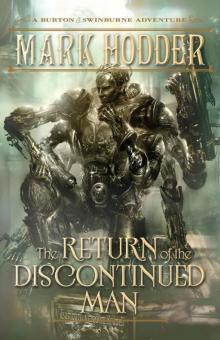 The Return of the Discontinued Man
The Return of the Discontinued Man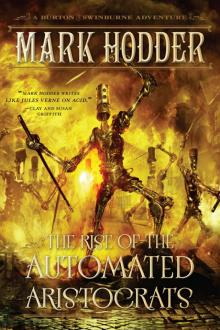 The Rise of the Automated Aristocrats
The Rise of the Automated Aristocrats Macallister Fogg 2: Great Great Great (And So Forth) Uncle Dragoslav
Macallister Fogg 2: Great Great Great (And So Forth) Uncle Dragoslav Sexton Blake and the Great War
Sexton Blake and the Great War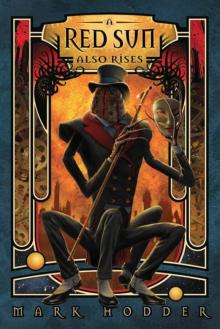 A Red Sun Also Rises
A Red Sun Also Rises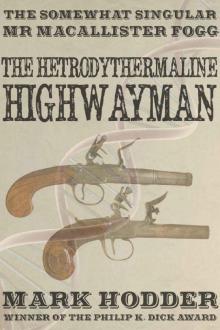 Macallister Fogg 3: The Hetrodythermaline Highwayman
Macallister Fogg 3: The Hetrodythermaline Highwayman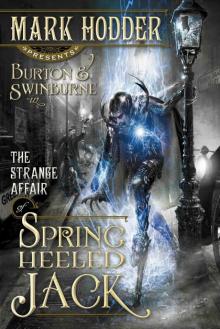 The Strange Affair of Spring Heeled Jack
The Strange Affair of Spring Heeled Jack Macallister Fogg 1: The Master Mummer's Mummy (The Adventures of Macallister Fogg)
Macallister Fogg 1: The Master Mummer's Mummy (The Adventures of Macallister Fogg)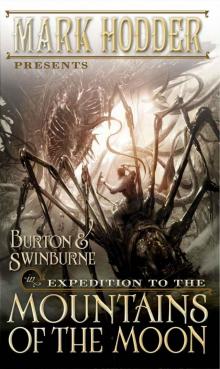 Expedition to the Mountains of the Moon bas-3
Expedition to the Mountains of the Moon bas-3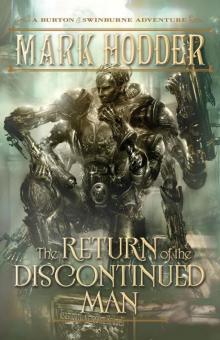 The Return of the Discontinued Man (A Burton & Swinburne Adventure)
The Return of the Discontinued Man (A Burton & Swinburne Adventure)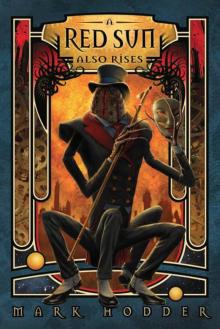 Red Sun Also Rises, A
Red Sun Also Rises, A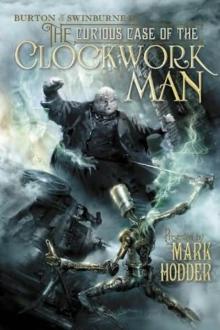 The curious case of the Clockwork Man bas-2
The curious case of the Clockwork Man bas-2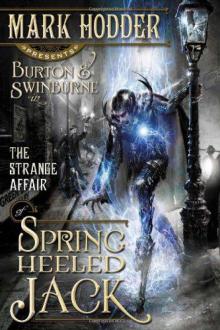 The strange affair of Spring-heeled Jack bas-1
The strange affair of Spring-heeled Jack bas-1